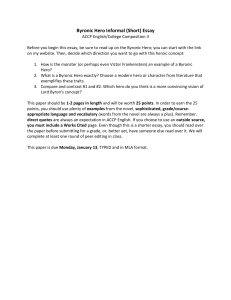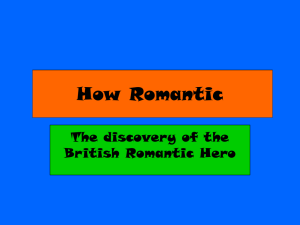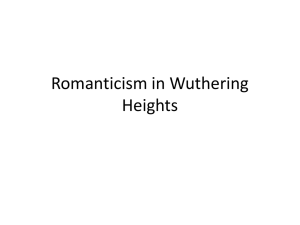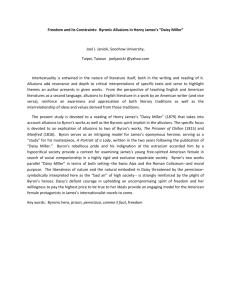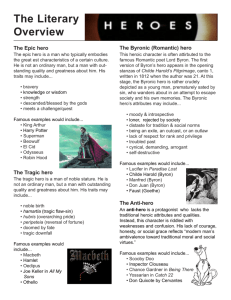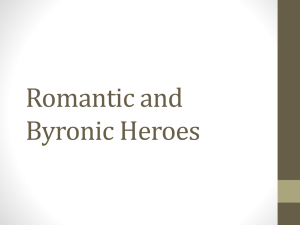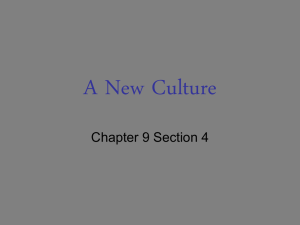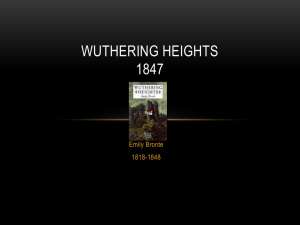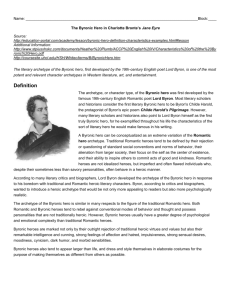LESSON 5: LQ: Can I analyse the presentation of courtly love in
advertisement
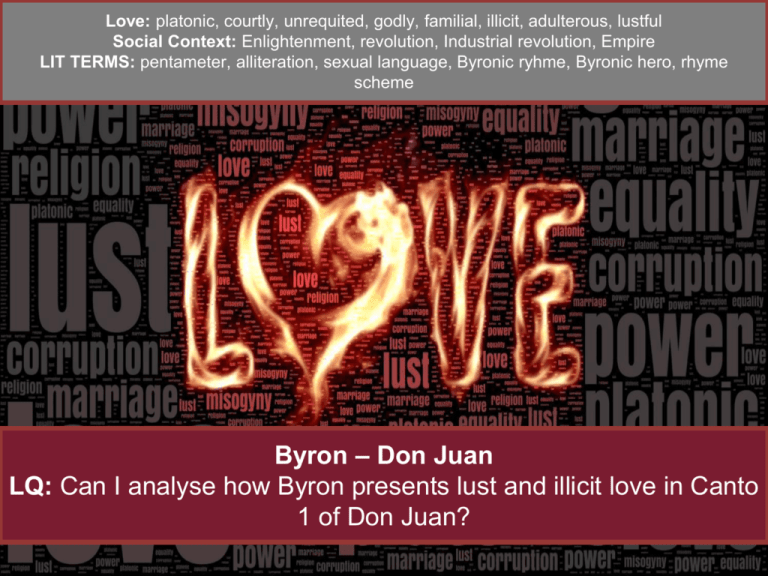
Love: platonic, courtly, unrequited, godly, familial, illicit, adulterous, lustful Social Context: Enlightenment, revolution, Industrial revolution, Empire LIT TERMS: pentameter, alliteration, sexual language, Byronic ryhme, Byronic hero, rhyme scheme Byron – Don Juan LQ: Can I analyse how Byron presents lust and illicit love in Canto 1 of Don Juan? Love: platonic, courtly, unrequited, godly, familial, illicit, adulterous, lustful Social Context: Enlightenment, revolution, Industrial revolution, Empire LIT TERMS: pentameter, alliteration, sexual language, Byronic ryhme, Byronic hero, rhyme scheme Outstanding progress: well-chosen quotations, sophisticated language used, literary devices analysed, effect on reader argued with perceptive points made, alternative interpretations revealed, developed consideration of social and historical context Excellent progress: well-chosen quotations, literary devices analysed, effect on reader discussed, alternative interpretations considered and social context mentioned Byron – Don Juan LQ: Can I analyse how Byron presents lust and illicit love in Canto 1 of Don Juan? Love: platonic, courtly, unrequited, godly, familial, illicit, adulterous, lustful Social Context: Enlightenment, revolution, Industrial revolution, Empire LIT TERMS: pentameter, alliteration, sexual language, Byronic ryhme, Byronic hero, rhyme scheme Each group has an extract of writing about Byron. Reduce to 3 sentences. Love: platonic, courtly, unrequited, godly, familial, illicit, adulterous, lustful Social Context: Enlightenment, revolution, Industrial revolution, Empire LIT TERMS: pentameter, alliteration, sexual language, Byronic ryhme, Byronic hero, rhyme scheme Review of Don Juan: A sense of guilt runs through these works – nameless, vaguely sexual, inescapable. It's a guilt that adolescents know about. The Byronic hero is defined by it. If it weren't for sex, he might be noble and good, as well as handsome, courageous, intelligent and charming. But sex always gets in the way. One of the great strange things about it is that it isn't at all about sexual guilt. The Don drifts disastrously from encounter to encounter and loves and grieves through each of them, sincerely and sweetly. He suffers expulsion, shipwreck, enslavement, war, celebrity – without any effect on his ability to love or grieve again. The problem for the Byronic hero is that he can't get over anything; the problem for Don Juan is that he can Shelley instantly recognised it as Byron's masterpiece; Byron lost his publisher over it. John Murray wanted him to cut some of his blasphemies – he moved too quickly in it from gay to grave. "Is it not life?" Byron replied. "Is it not the thing? – Could any man have written it – who has not lived in the world? – and tooled in a post-chaise? In a hackney coach? In a Gondola? Against a wall? In a court carriage? In a vis a vis? – on a table? – and under it?" Love: platonic, courtly, unrequited, godly, familial, illicit, adulterous, lustful Social Context: Enlightenment, revolution, Industrial revolution, Empire LIT TERMS: pentameter, alliteration, sexual language, Byronic ryhme, Byronic hero, rhyme scheme The Byronic hero presents an idealised, but flawed character whose attributes include: great talent; great passion; a distaste for society and social institutions; a lack of respect for rank and privilege (although possessing both); being thwarted in love by social constraint or death; rebellion; exile; an unsavory secret past; arrogance; overconfidence or lack of foresight; and, ultimately, a self-destructive manner. These types of characters have since become ubiquitous in literature and politics. As a boy, his character is described as a "mixture of affectionate sweetness and playfulness, by which it was impossible not to be attached", although he also exhibited "silent rages, moody sullenness and revenge" with a precocious bent for attachment and obsession.[72] He described his first intense feelings at age eight for Mary Duff, his distant cousin: Love: platonic, courtly, unrequited, godly, familial, illicit, adulterous, lustful Social Context: Enlightenment, revolution, Industrial revolution, Empire LIT TERMS: pentameter, alliteration, sexual language, Byronic ryhme, Byronic hero, rhyme scheme "How very odd that I should have been so devotedly fond of that girl, at an age when I could neither feel passion, nor know the meaning of the word and the effect! My mother used always to rally me about this childish amour, and at last, many years after, when I was sixteen, she told me one day, 'O Byron, I have had a letter from Edinburgh, and your old sweetheart, Mary Duff, is married to Mr. C***.' And what was my answer? I really cannot explain or account for my feelings at that moment, but they nearly threw me into convulsions...How the deuce did all this occur so early? Where could it originate? I certainly had no sexual ideas for years afterwards; and yet my misery, my love for that girl were so violent, that I sometimes doubt if I have ever been really attached since. Be that as it may, hearing of her marriage several years after was like a thunder-stroke — it nearly choked me — to the horror of my mother and the astonishment and almost incredulity of every body. And it is a phenomenon in my existence (for I was not eight years old) which has puzzled, and will puzzle me to the latest hour of it; and lately, I know not why, the recollection (not the attachment) has recurred as forcibly as ever...But, the more I reflect, the more I am bewildered to assign any cause for this precocity of affection.” Love: platonic, courtly, unrequited, godly, familial, illicit, adulterous, lustful Social Context: Enlightenment, revolution, Industrial revolution, Empire LIT TERMS: pentameter, alliteration, sexual language, Byronic ryhme, Byronic hero, rhyme scheme Byron also became attached to Margaret Parker, another distant cousin. While his recollection of his love for Mary Duff is that he was ignorant of adult sexuality during this time, and was bewildered as to the source of the intensity of his feelings, he would later confess that: "My passions were developed very early — so early, that few would believe me — if I were to state the period — and the facts which accompanied it. Perhaps this was one of the reasons that caused the anticipated melancholy of my thoughts — having anticipated life.” This is the only reference Byron himself makes to the event, and he is ambiguous as to how old he was when it occurred. After his death, his lawyer wrote to a mutual friend telling him a "singular fact" about Byron's life which was "scarcely fit for narration". But he disclosed it nonetheless, thinking it might explain Byron's sexual "propensities": "When nine years old at his mother's house a Scotch girl [May, sometimes called Mary, Gray, one of his first caretakers] used to come to bed to him and play tricks with his person.” Gray later used this sexual abuse as a means of ensuring his silence if he were to be tempted to disclose the "low company" she kept during drinking binges. She was later dismissed, supposedly for beating Byron when he was 11. Love: platonic, courtly, unrequited, godly, familial, illicit, adulterous, lustful Social Context: Enlightenment, revolution, Industrial revolution, Empire LIT TERMS: pentameter, alliteration, sexual language, Byronic ryhme, Byronic hero, rhyme scheme SECTIONS OF CANTO 1 1. Type(s) of love 2. Analyse for language, structural techniques used in presenting love 3. Any social/contextual points? EXT: how is FORM worth noting? Outstanding progress: wellchosen quotations, sophisticated language used, literary devices analysed, effect on reader argued with perceptive points made, alternative interpretations revealed, developed consideration of social and historical context Excellent progress: wellchosen quotations, literary devices analysed, effect on reader discussed, alternative interpretations considered and social context mentioned Love: platonic, courtly, unrequited, godly, familial, illicit, adulterous, lustful Social Context: Enlightenment, revolution, Industrial revolution, Empire LIT TERMS: pentameter, alliteration, sexual language, Byronic ryhme, Byronic hero, rhyme scheme SECTIONS OF CANTO 1 Join with another group Once you have fed back ideas, link to wider reading Outstanding progress: wellchosen quotations, sophisticated language used, literary devices analysed, effect on reader argued with perceptive points made, alternative interpretations revealed, developed consideration of social and historical context Excellent progress: wellchosen quotations, literary devices analysed, effect on reader discussed, alternative interpretations considered and social context mentioned Love: platonic, courtly, unrequited, godly, familial, illicit, adulterous, lustful Social Context: Enlightenment, revolution, Industrial revolution, Empire LIT TERMS: pentameter, alliteration, sexual language, Byronic ryhme, Byronic hero, rhyme scheme Outstanding progress: wellchosen quotations, sophisticated language used, literary devices analysed, effect on reader argued with perceptive points made, alternative interpretations revealed, developed consideration of social and historical context Feedback to class Excellent progress: wellchosen quotations, literary devices analysed, effect on reader discussed, alternative interpretations considered and social context mentioned Love: platonic, courtly, unrequited, godly, familial, illicit, adulterous, lustful Social Context: Enlightenment, revolution, Industrial revolution, Empire LIT TERMS: pentameter, alliteration, sexual language, Byronic ryhme, Byronic hero, rhyme scheme How does Byron present love in the first Canto of his poem “Don Juan”? 2 paras: 1. close analysis of Don Juan 2. Wider reading link Outstanding progress: wellchosen quotations, sophisticated language used, literary devices analysed, effect on reader argued with perceptive points made, alternative interpretations revealed, developed consideration of social and historical context Excellent progress: wellchosen quotations, literary devices analysed, effect on reader discussed, alternative interpretations considered and social context mentioned Love: platonic, courtly, unrequited, godly, familial, illicit, adulterous, lustful Social Context: Enlightenment, revolution, Industrial revolution, Empire LIT TERMS: pentameter, alliteration, sexual language, Byronic ryhme, Byronic hero, rhyme scheme How do you imagine people received such an epic poem? Who was his audience? Outstanding progress: wellchosen quotations, sophisticated language used, literary devices analysed, effect on reader argued with perceptive points made, alternative interpretations revealed, developed consideration of social and historical context Excellent progress: wellchosen quotations, literary devices analysed, effect on reader discussed, alternative interpretations considered and social context mentioned
